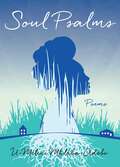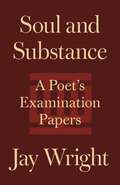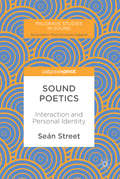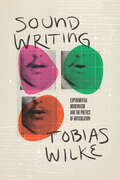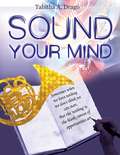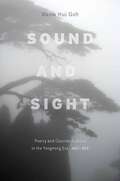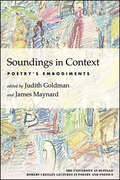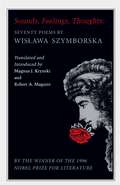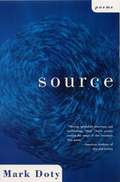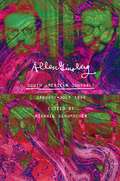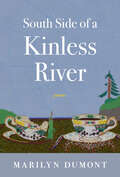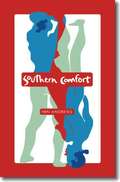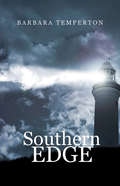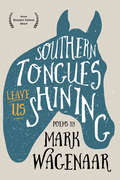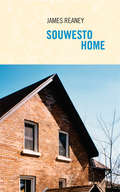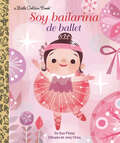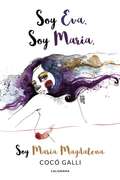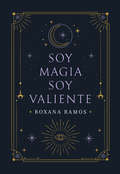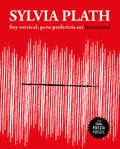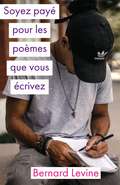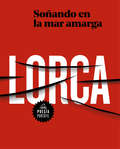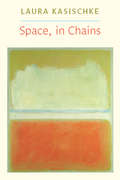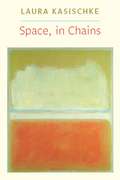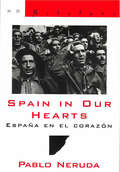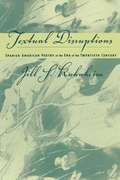- Table View
- List View
Soul Psalms: Poems
by U-Meleni Mhlaba-AdeboSoul Psalms, a collection of poems from Zimbabwean American poet U-Meleni Mhlaba-Adebo, is filled with lyrical and vivid imagery that takes you on a emotional journey toward finding self. Exploring themes of family, love, body image, acceptance, and belonging, Mhlaba-Adebo&’s words flow melodically and powerfully, bringing readers to a place of peace. The themes in Soul Psalms may be personal, but they appeal to a universal pull: the desire to become.
Soul and Substance: A Poet's Examination Papers
by Jay WrightA collection of new and startlingly original essays from an acclaimed poet, essayist, and playwrightJay Wright is widely recognized as one of the most important American poets of the past half century. But in recent years, he has also written a series of unconventional essays that he calls “examination papers,” which he defines as “designated inquiries to myself.” In these linked essays, most of which resemble prose-poems, with only a few lines set on each page, Wright explores abiding artistic and philosophical concerns, including language, aesthetic form, knowledge, time, and death. Soul and Substance presents these pieces for the first time.Drawing on everything from African mythology to mathematical axioms, Wright reflects on a wide range of topics: the difficulties of defining and confronting death; the challenge of transcending one’s own consciousness; the nature of rhythm and the structure of space; and the relationship among the self, the body, and the material world. Throughout, the book examines the limits of human knowledge and the implications of our always imperfect understanding.Experimental and original, Soul and Substance is an important addition to the work of a major writer.
Sound Poetics
by Seán StreetThis book examines sonic signals as something both heard internally and externally, through imagination, memory and direct response. In doing so it explores how the mind 'makes' sound through experience, as it interprets codes on the written page, and creates an internal leitmotif that then interacts with new sounds made through an aural partnership with the external world, chosen and involuntary exposure to music and sound messages, both friendly and antagonistic to the identity of the self. It creates an argument for sound as an underlying force that links us to the world we inhabit, an essential part of being in the same primal sense as the calls of birds and other inhabitants of a shared earth. Street argues that sound as a poetic force is part of who we are, linked to our visualisation and sense of the world, as idea and presence within us. This incredibly interdisciplinary book will be of great interest to scholars of radio, sound, media and literature as well as philosophy and psychology.
Sound Writing: Experimental Modernism and the Poetics of Articulation
by Tobias WilkeConsiders the avant-garde rethinking of poetic language in terms of physical speech production. Avant-garde writers and artists of the twentieth century radically reconceived poetic language, appropriating scientific theories and techniques as they turned their attention to the physical process of spoken language. This modernist “sound writing” focused on the bodily production of speech, which it rendered in poetic, legible, graphic form. Modernist sound writing aims to capture the acoustic phenomenon of vocal articulation by graphic means. Tobias Wilke considers sound writing from its inception in nineteenth-century disciplines like physiology and experimental phonetics, following its role in the aesthetic practices of the interwar avant-garde and through to its reemergence in the postwar period. These projects work with the possibility of crossing over from the audible to the visible, from speech to notation, from body to trace. Employing various techniques and concepts, this search for new possibilities played a central role in the transformation of poetry into a site of radical linguistic experimentation. Considering the works of writers and artists—including Raoul Hausmann, Kurt Schwitters, Viktor Shklovsky, Hugo Ball, Charles Olson, and Marshall McLuhan—Wilke offers a fresh look at the history of the twentieth-century avant-garde.
Sound Your Mind
by D. Ivan Ursey II Jdamian Brown Tabitha A. DragoLife experiences expressed through inspirational poetry.
Sound and Sight: Poetry and Courtier Culture in the Yongming Era (483-493)
by Meow GohThis is the first book to examine Chinese poetry and courtier culture using the concept of shengse—sound and sight—which connotes "sensual pleasure." Under the moral and political imperative to avoid or even eliminate representations of sense perception, premodern Chinese commentators treated overt displays of artistry with great suspicion, and their influence is still alive in modern and contemporary constructions of literary and cultural history. The Yongming poets, who openly extolled "sound and rhymes," have been deemed the main instigators of a poetic trend toward the sensual. Situating them within the court milieu of their day, Meow Hui Goh asks a simple question: What did shengse mean to the Yongming poets? By unraveling the aural and visual experiences encapsulated in their poems, she argues that their pursuit of "sound and sight" reveals a complex confluence of Buddhist influence, Confucian value, and new sociopolitical conditions. Her study challenges the old perception of the Yongming poets and the common practice of reading classical Chinese poems for semantic meaning only.
Soundings in Context: Poetry's Embodiments (The University at Buffalo Robert Creeley Lectures in Poetry and Poetics)
by James Maynard Judith GoldmanSoundings in Context brings together the second and third University at Buffalo Robert Creeley Lectures in Poetry and Poetics by the renowned literary and textual scholar Jerome McGann, and the innovative, prolific Canadian poet, essayist, and novelist Lisa Robertson, respectively. The volume's first half presents McGann's "Reading (I Mean Articulating) Poetry, a Multi-Player Game," with responses by Nikolaus Wasmoen and Steve McCaffery; the second presents Lisa Robertson's "Dous Chantar: Refrain for a Nightingale," with responses by Shannon Maguire and Liz Howard. Initially given at different moments and since revised, the pieces considered in the lectures range widely, moving from the Romantics and medieval troubadour poetry to T. S. Eliot, Jackson Mac Low, Jacques Rouboud, and far beyond. Still, they are collectively concerned with questions of voice, recitation, and reception in different contexts; with sonic patterning and its modes of significance; and with foregrounding an embodied experience of oral and written language as opposed to its interpretation. McGann, Robertson, and their interlocutors all propose affective, pragmatic approaches to poetry that allow it to surface as materially formative, alive and lived. Reading their contributions together offers an opportunity to see how these values present themselves in differing cultures of poetic scenography across space and time.
Sounds, Feelings, Thoughts: Seventy Poems by Wislawa Szymborska - Bilingual Edition (The Lockert Library of Poetry in Translation #145)
by Wislawa SzymborskaTranslated and Introduced by Magnus J. Krynski and Robert A. Maguire Regarded as one of the best representatives since World War II of the rich and ancient art of poetry in Poland, Wislawa Szymborska (1923-2012) is, in the translators' words, "that rarest of phenomena: a serious poet who commands a large audience in her native land." The seventy poems in this bilingual edition are among the largest and most representative offering of her work in English, with particular emphasis on the period since 1967. They illustrate virtually all her major themes and most of her important techniques. Describing Szymborka's poetry, Magnus Krynski and Robert Maguire write that her verse is marked by high seriousness, delightful inventiveness, a prodigal imagination, and enormous technical skill. She writes of the diversity, plenitude, and richness of the world, taking delight in observing and naming its phenomena. She looks on with wonder, astonishment, and amusement, but almost never with despair.
Source
by Mark DotyThis bold, wide-ranging collection -- his sixth book of poems -- demonstrates the unmistakable lyricism, fierce observation, and force of feeling that have made Mark Doty's poems special to readers on both sides of the Atlantic. The poems in Source deepen Doty's exploration of the paradox of selfhood. They offer a complex, boldly colored self-portrait; their muscular lines argue fiercely with the fact of limit; they pulse with the drama of perception and the quest to forge meaning.
South American Journals: January–July 1960
by Allen GinsbergThe great Beat poet&’s observations, reflections, poetry, and mind-expanding explorations while traveling through South America When Allen Ginsberg went to South America in 1960, ostensibly to attend a literary conference, he had a different kind of trip in mind. This would be another experience in the Beat poet&’s journey deep into the realm of consciousness, the inward travel explored to exhilarating effect in his writing—whether in the poetry that had already earned him international acclaim or in the idiosyncratic journals that raised self-documentation to a new form of art. In his South American Journals, covering a tumultuous six months, Ginsberg describes his travels through Chile and Peru, his visit to Machu Picchu, and his search for a source for ayahuasca, or yagé, a mind-expanding drug recommended by his friend William S. Burroughs, another writer well traveled in altered states of consciousness.Far from quotidian diary entries, Ginsberg&’s observations in these pages, interspersed with poetry, dream notations, and musings about spirituality, amount to a critical chapter in the poet&’s informal autobiography. Writing more during these six months than in any of his other journals, Ginsberg summons great ferment. In his distinctive accounts of all that he encounters, elevating travel writing to lyrical expression; in an abundance of poems published here for the first time, in both first drafts and polished forms; in his reports of fascinating conversations; and, in particular, in detailed passages that delve into inner recesses of his consciousness, Ginsberg recreates a journey like no other, one that reflects the workings of one of the best minds of his generation in the world of his own making and in its mysterious, immutable counterpart in the South American landscape.
South Side of a Kinless River
by Marilyn DumontFeatured on Quill & Quire's Fall PreviewA nuanced, relational, and community-minded new book from one of Canada's preeminent poets.South Side of a Kinless River wrestles with concepts of Métis identity in a nation and territory that would rather erase it. Métis identity, land loss, sexual relationships between Indigenous women and European men, and midwifery by Indigenous women of the nascent settler communities figure into these poems. They add up to a Métis woman's prairie history, one that helps us feel the violence in how those contributions and wisdoms have been suppressed and denied."Each poem is an anthem, every page showcasing the talent and necessity of this incredible poetic voice. Dumont brings the Métis tone, cadence and intricate stitch-work into all she creates." - Cherie Dimaline, author of The Marrow Thieves and Empire of the Wild"The voice of this Métis woman is as loving, tender and humane, as it is powerful, satirical and political..." - Rita Bouvier, author of a beautiful rebellion
Southern Comfort
by Nin AndrewsIn this collection of linked poems, Andrews describes a childhood during the Vietnam War era on a farm in a divided household with a southern father and northern mother. The memories and trials of childhood come from a fabled place where whiskey and story were shared by children, and superstitions and mythmaking were a way of life.
Southern Edge
by Barbara TempertonIn this collection of three long narrative poems, Temperton conjures up the highs and lows of the coastal environment to explore the effects of nature’s “Powerful forces at work” on human existence.An impressive third collection written with flair, passion and the ability to look unpleasant realities in the eye.
Southern Tongues Leave Us Shining: Poems
by Mark WagenaarIn his third collection, the award-winning author crafts poems that “reckon with the sins of history and the human-made scars on the natural world” (Beth Ann Fennelly, Poet Laureate of Mississippi).Winner of the 2016 Benjamin Saltman Poetry Award, Southern Tongues Leave Us Shining explores the South and its history through the eyes of the living, the dead, and the inbetween.“The songs of Charles Wright, Rilke, and Blind Willie Johnson have tuned Wagenaar’s ear, but the music is his own, irresistibly so. Southern Tongues Leave Us Shining is a brave and difficult grappling, ending with the difficult joy of a child’s birth and the world’s subsequent remaking. This is, simply put, poetry that adds to the glory of the human endeavor.” —Beth Ann Fennelly, author of Heating & Cooling“In Southern Tongues Leave Us Shining, there is a rapturous beauty that encompasses the American South, the United States, and the world, a poetic rooted in the space around the poet and extending outward to the world with questioning, compassion, grief, and hope.” —Afaa M. Weaver, winner of the Kingsley Tufts Poetry Award“The speaker searches constantly for evidence of God’s presence in the world. It is a book of doubt just as much as it is a book of faith. Indeed, doubt threatens, at every line break, to wrest faith from the speaker’s hands. But books of doubt are books of faith, and Southern Tongues understands this.” —Los Angeles Review of Books
Souwesto Home
by James ReaneyThe poems in Souwesto Home are fresh, youthful meditations on such diverse subjects as the Little Lakes near Stratford, Ontario, the flora of Elgin County, the Donnelly feud, lichens, a Department Store Jesus, and so on. The collection ranges widely in tone and technique, from the lyrical to the satirical, from the direct and straightforward to the linguistically playful. As ever, Reaney’s signature voice, his inimitable combination of sophistication and child-like simplicity, may be heard in every line. Like his contemporaries, P.K. Page, Margaret Avison and Colleen Thibaudeau (his wife), he has lost nothing of his poetic prowess to advancing years.
Soy Bailarina de Ballet (Little Golden Book)
by Sue FliessUn libro en rima, entre los más vendidos de los Little Golden Books, acerca de una pequeña niña que estudia ballet — ¡ahora en español!Únete al regocijo de una niña que va a clase de ballet y luego participa en su primer recital. Un libro rimado y divertido, perfecto para ser leído en voz alta, con encantadoras ilustraciones que deleitarán a los niños. ¡Un regalo estupendo para todos los pequeños que disfrutan de la danza! A rhyming best-selling Little Golden Book about a young girl learning ballet--now in Spanish!Join in on the fun as a young girl goes to ballet class and then performs in her very first recital. This rhyming Little Golden Book is a fun read-aloud with delightful art that children will really enjoy. Makes a terrific gift for all young dancers!
Soy Eva. Soy María. Soy María Magdalena
by Cocó GalliNi la bruja, ni la madre, ni la puta. Tu hermana soy. <P><P>Cocó Galli nos invita y nos habla íntimamente desde su ser mujer. <P>Su mirada invita al encuentro entre hombres y mujeres en el ejercicio de la libertad, único espacio donde puede nacer el amor, denunciando las relaciones de poder, dominación, sumisión, culturales y de ilusiones, que el mundo nos impuso, llevándonos al desencuentro y a la infelicidad. Intenta construir con sus palabras un espacio para que el amor suceda sin fronteras entre Eros, Filia y Agape. <P>Sus poemas nos invitan a un verdadero encuentro.
Soy magia, soy valiente
by Roxana RamosSoy magia, soy valiente explora los vericuetos de un amor que no pudo ser, pero del que se renace más consciente desde la vulnerabilidad. Volcando la mirada hacia el interior, Roxana Ramos nos deshila las múltiples caras del abandono por medio de su delicada prosa, llevándonos de la mano hacia un enfrentamiento contra la realidad para encontrar las respuestas que tanto estamos buscando dentro de nosotros mismos. Podrás convertir este libro en tu diario personal a través de páginas destinadas a ello, en las que explorarás tus propios pensamientos, conservándolos para siempre. Porque aquí también está tu historia.
Soy vertical, pero preferiría ser horizontal (Flash Poesía #Volumen)
by Sylvia PlathSylvia Plath, una de las grandes poetas del siglo XX, llega a la colección «Poesía Portátil». Sylvia Plath es una de las poetas más admiradas del siglo XX. Sus versos, que a lo largo de los años han ido cobrando protagonismo especialmente después de que se quitara la vida a los treinta años, son un intento de expresar su desesperación y su obsesión por la muerte. Sus poemas se pueden considerar en gran parte autobiográficos y exploran su angustia mental, su problemático matrimonio con el también poeta Ted Hughes y los conflictos sin resolver con sus padres, así como la visión que tenía de ella misma. Tanto ella como su obra se ha ido perfilando hasta el día de hoy como uno de los grandes iconos del feminismo, y su poesía -en especial El coloso y el póstumo Ariel-, como objetos adorados, valiosas pruebas de que Sylvia Plath fue una de las grandes figuras de la literatura del pasado siglo. Después de más de cincuenta años de ser escritos, sus versos todavía contienen toda su intensidad, todo su dolor y toda su belleza. -------«Entonces el cielo y yo conversamos abiertamente.Y seguro que seré más útil cuando al fin me tienda para siempre:entonces quizá los árboles me toquen por una vezy las flores, finalmente, tengan tiempo para mí.»-------
Soyez payé pour les poèmes que vous écrivez
by Bernard LevineMaintenant, vous pouvez être payé pour la poésie que vous écrivez et faire publier vos poèmes dans des cartes de vœux, calendriers, affiches et plaques murales. Voici les renseignements exclusifs de Bernard Levine, auteur de cartes de vœux depuis plus de 30 ans, sur la façon dont vous aussi, vous pouvez être payé. Retrouvez tous vos vieux vers romantiques que vous avez écrits et faites publier vos poèmes avec de l'argent sur votre compte bancaire ! Écrire des poèmes pour de l'argent est une activité très amusante et très rentable ! Soyez payé pour faire ce que vous aimez.
Soñando en la mar amarga (Flash Poesía)
by Federico García LorcaLa colección «Poesía portátil» reúne en Soñando en la mar amarga los versos más representativos de Lorca, una selección de romances y canciones que se mueven entre lo romántico, lo trágico y lo onírico. Muestra indispensable del máximo exponente de la identificación entre poesía y pueblo. Icónico por sus versos y por el exitoso diálogo que establece con cada lector, Lorca fue una de las primeras figuras de la Generación del 27, consagrándose plenamente con el Romancero gitano. El más grande poeta del siglo XX español ha despertado la admiración entre lectores de todas las edades, atraídos por una lírica vitalista que ha influenciado a artistas de múltiples disciplinas. La atribulada vida de Lorca y su trágico final le han convertido también en el símbolo de los años más oscuros de este país. -------«Tú no sabrás nunca,esfinge de nieve,lo mucho que yote hubiera queridoesas madrugadascuando tanto lluevey en la rama secase deshace el nido.»-------
Space, In Chains
by Laura Kasischke"Kasischke's intelligence is most apparent in her syntactic control and pace, the way she gauges just when to make free verse speed up, or stop short, or slow down."-The New York Times Book Review"Kasischke's poems are powered by a skillful use of imagery and the subtle, ingenious way she turns a phrase."-Austin American-StatesmanLaura Kasischke's poems have the same haunting qualities and truth as our most potent memories and dreams. Through ghostly voices, fragmented narratives, overheard conversations, songs, and prayers in language reminiscent of medieval lyrics converted into contemporary idiom, the poems in Space, In Chains create a visceral strangeness true to its own music.So we found ourselves in an ancient place, the veryair around us bound by chains. There wasstagnant water in which lightningwas reflected, like desperationin a dying eye. Like science. Likea dull rock plummeting through space, tossingoff flowers and veils, like a bride. Andalso the subway.Speed under ground.And the way each body in the room appeared to bea jar of wasps and flies that day-but, enchanted,like frightened children's laughter.Laura Kasischke is the author of thirteen books of poetry and fiction. Her novel Her Life Before Her Eyes was adapted for the screen and starred Uma Thurman. A Guggenheim Fellow in 2009, she teaches in the MFA program at the University of Michigan.
Space, in Chains
by Laura Kasischke"Kasischke's verses walk that perfect Plathian line between the everyday ... and the eternal." --Time Magazine.
Spain in Our Hearts: Espana en el corazon (New Directions Bibelot)
by Pablo Neruda Donald D. WalshNeruda's epic hymn against fascism, Spain in Our Hearts, now available in this pocket Bibelot edition. In 1936, Pablo Neruda was Chile's consul in Madrid, and so horrified by the civil war and the murder of his friend, Federico Garcia Lorca, that he started writing what became his most politically passionate series of poems, Spain in Our Hearts. The collection was printed by soldiers on the front lines of the war, and later incorporated into the third volume of Neruda's revolutionary collection, Residence on Earth. This bilingual New Directions Bibelot edition presents Spain in Our Hearts as a single book as it was first published, a tribute to Neruda's everlasting spirit.
Spanish American Poetry at the End of the Twentieth Century: Textual Disruptions
by Jill S. KuhnheimHas poetry lost its relevance in the postmodern age, unable to keep pace with other forms of cultural production such as film, mass media, and the Internet? Quite the contrary, argues Jill Kuhnheim in this pathfinding book, which explores how recent Spanish American poetry participates in the fundamental cultural debates of its time. Using a variety of interdisciplinary approaches, Kuhnheim engages in close readings of numerous poetic works to show how contemporary Spanish American poetry struggles with the divisions between politics and aesthetics and between visual and written images; grapples with issues of ethnic, national, sexual, and urban identities; and incorporates rather than rejects technological innovations and elements from the mass media. Her analysis illuminates the ways in which contemporary issues such as indigenismo and Latin America's postcolonial legacy, modernization, immigration, globalization, economic shifts toward neoliberalism and informal economies, urbanization, and the technological revolution have been expressed in-and even changed the very form of-Spanish American poetry since the 1970s.
